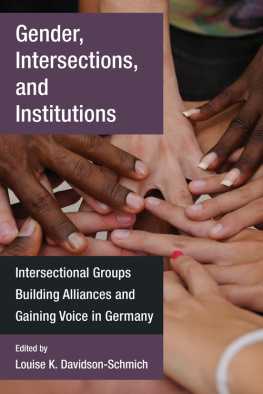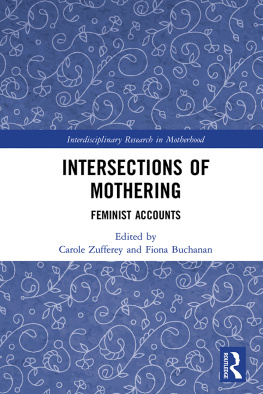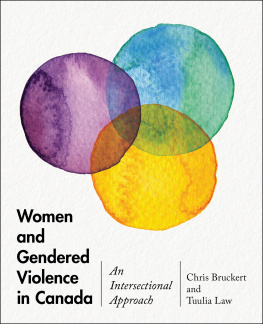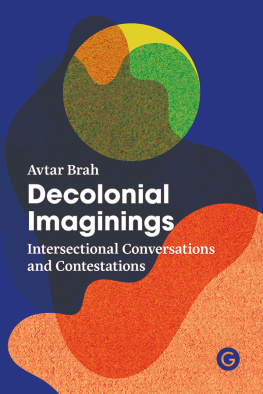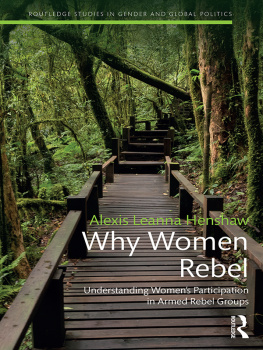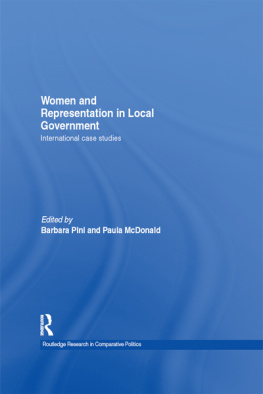Gender, Intersections, and Institutions
Germany serves as a case study of when and how members of intersectional groupsindividuals belonging to two or more disadvantaged social categoriescapture the attention of policymakers and what happens when this phenomenon occurs. This edited volume identifies three venues through which intersectional groups form alliances and generate policy discussions regarding their concerns. Original empirical case studies focus on a wide range of timely subjects, including the intersexed, gender and disability rights, lesbian parenting, women working in STEM fields, workers rights in feminized sectors, women in combat, and Muslim women and girls.
Louise Davidson-Schmich is Professor of Political Science at the University of Miami.
Gender, Intersections, and Institutions
Intersectional Groups Building Alliances and Gaining Voice in Germany
Edited by Louise K. Davidson-Schmich
University of Michigan Press
Ann Arbor
Copyright 2017 by Louise K. Davidson-Schmich
All rights reserved
This book may not be reproduced, in whole or in part, including illustrations, in any form (beyond that copying permitted by Sections 107 and 108 of the U.S. Copyright Law and except by reviewers for the public press), without written permission from the publisher.
Published in the United States of America by the
University of Michigan Press
Manufactured in the United States of America
A CIP catalog record for this book is available from the British Library.
Library of Congress Cataloging-in-Publication Data
Names: Davidson-Schmich, Louise K., 1968 editor.
Title: Gender, intersections, and institutions : intersectional groups building alliances and gaining voice in Germany / edited by Louise K. Davidson-Schmich.
Description: Ann Arbor : University of Michigan Press, 2017. | Includes bibliographical references and index.
Identifiers: LCCN 2017018832| ISBN 9780472130535 (hardcover : alk. paper) | ISBN 9780472123216 (e-book)
Subjects: LCSH: MinoritiesPolitical activityGermany. | MinoritiesCivil rightsGermany. | Pressure groupsGermany. | Intersectionality (Sociology)Political aspectsGermany. | GermanyPolitics and government1990
Classification: LCC JN 3971. A 38 M 545 2017 | DDC 306.760943dc23
LC record available at https://lccn.loc.gov/2017018832
Our organization came about because we were motivated to give women like us a voice and to demonstrate [our point of view] in politics.... We didnt see ourselves represented in previous debates.
Wir sind aus der Motivation heraus entstanden, Frauen wie uns eine Stimme zu geben und gegenber der Politik zu demonstrieren.... Wir haben uns in der Debatte vorher nicht wiedergefunden.
Gnl Halat-Mec, Frankfurt Progressive Womens Initiative, 2012
Contents
Louise K. Davidson-Schmich
Many contributors to this volume cite debates held in and documents discussed by the two houses of the German parliament, the Bundestag and Bundesrat. All of these documents are available at http://pdok.bundestag.de/ (Bundestag) and http://www.bundesrat.de/DE/dokumente/dokumente-node.html (Bundesrat). Documents are cited here using abbreviations for the particular chamber of the parliament (BT for Bundestag, BR for Bundesrat), the type of document referenced, the documents number, and its date. Transcripts of plenary sessions are called Plenarprotokolle, and written reports tabled in the legislature are referred to as Drucksachen. Each document is numbered first according to the electoral period in which it was produced (for example, the 201316 legislative period is no. 18) and second according to the order that the debate was held, or the paperwork submitted, during that legislative session. Finally, the date of each transcript or report is included in the reference in the day.month.year format. Thus, the transcript of the first meeting of the Bundestag following the 2013 election would be referred to here as BT-Plenarprotokoll, 18/1, 22.10.13.
This volume began as a November 2012 workshop on Gendering Marginalized Interests at the University of Miami. This workshop was sponsored by the University of Miamis Scientists and Engineers Expanding Diversity and Success (SEEDS) Program, itself a product of a National Science Foundation Advance grant, the University of Miami Womens and Gender Studies Program, and the University of Miamis Department of Political Science. Four of the contributors to this volumeLouise K. Davidson-Schmich, Barbara Donovan, Angelika von Wahl, and Christina Xydiasalong with Sarah Wiliarty of Wesleyan University, attended. In the intervening years we recruited contributors from around the world, including Jeff Bale, Katja M. Guenther, Annette Henninger, Lisa Pfahl, and Swantje Kbsell. We met and presented various versions of the chapters at meetings of the American Political Science Association, the Council for European Studies, the European Consortium for Political Researchs Standing Group on Gender and Politics, the German Studies Association, and the Midwest Political Science Association. Louise Davidson-Schmich presented parts of the book at the University of Miami Faculty Colloquium and at a conference on Resistance, Backlash, and Power: Gender Equality and Feminist New Practice in EU and Global Discourse held at the University of Canterbury in Christchurch, New Zealand. Many thanks to all who attended these presentations to offer their feedback as well as to three anonymous reviewers and a helpful member of the University of Michigan Presss Executive Committee. We also extend our thanks to Melody Herr, formerly of the University of Michigan Press, for her faith in our project, and to Mary Francis, Meredith Norwich, Danielle Coty, and Kevin Rennells at Michigan, for their assistance in preparing the manuscript for publication. Finally, we acknowledge the efforts of all the members of the intersectional groups in Germany we have studied. They are fighting to build alliances and make their voices heard to create a more just world.
Louise K. Davidson-Schmich
On November 1, 2013, Germany became one of the first countries in the world to offer parents of intersex newborns the freedom to avoid hasty surgeries and leave their babys sex unspecified on the birth certificate and other identity documents. In 2007, a national debate broke out in the Federal Republic about the perceived problems of forced marriages in the migrant community and of immigrant womens linguistic isolation; the countrys immigration law was revised to address these concerns. And in 2015, after a decade of political debate, Germany introduced a minimum wage law, lifting the earnings of the lowest-paid employees in the countrytwo-thirds of them women.
In all of these examples, national-level political debates focused on the (perceived) concerns of people belonging to more than one disempowered grouppoor women, migrant women, and intersex individuals who can claim membership in neither category of the sex binary. While these developments are consistent with normative expectations about how democracy should work (elected officials represent the concerns of the governed), and while such public attention to a groups concerns is a commonplace occurrence for individuals belonging to multiply empowered groups (such as businessmen or well-to-do white families), elite discussion of and legislation regarding the needs of individuals at the intersections of disempowered groups is unusual.
Instead, extensive research on intersectionality, or the study of overlapping social identities and systems of oppression, has consistently found that citizens belonging to intersectional groups are often overlooked by or invisible to policymakers. For example, Kimberl Williams Crenshaws (2005 [1989]) pioneering work on African American womens experiences with employment discrimination found that the U.S. womens movement focused primarily on rectifying the concerns of white women, while civil rights organizations championed the needs of male African American workers, with both overlooking the problems faced by individuals discriminated against on the basis of their race

